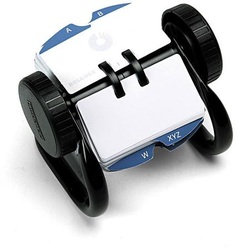
Yes, you read that right. Rolodex is a trademark. It has been since 1940, the first year that Arnold Neustadter, the original inventor with an obsession for details and organization, sold the product. Besides being registered for a “paper dispensing device for desks” (“paper” meaning small cards that are dispensed as blanks sheets for information to be recorded on), Rolodex® is now a trademark for all sorts of workplace and contact management products. A trademark portfolio for a household name with only 8 trademarks may not seem like much but hey, its quality not quantity.
Consider the case of Escalator, Yo-Yo, Zamboni, and Thermos. What each of these once recognized trademarks has in common is that they were all used with products that had no predecessors, nothing that a person could use in describing the product. When the products were first released, the maker had to work hard to ensure that the brand name used for the product didn’t fall into the public lexicon as the name of the product. For when that happens, as any regular reader of this blog should know by now, the brand becomes generic and is fair game for any company that wants to use the brand name for their product. Why should a name that the marketplace has adopted as the name of the product (as opposed to a specific source of the product) be prevented from being adopted by other companies? It is an argument steeped in economic efficiency.
Okay so back to Rolodex. No doubt you have been part of a conversation recently with a friend or business colleague where you casually said “Can I have your contact info so I can put it in my rolodex?” Chances are when you say this, you aren’t thinking of actual Rolodex rotary card file. After all, who carries those around anyways? Instead, what you are thinking of is the general idea of storing phone numbers, something that the Rolodex rotary system does exceptionally well while providing a convenient single-word identifier that most people understand. But, you might ask, if Rolodex is sometimes equated to a type of product rather than a source of a specific product, doesn’t that mean that the brand has become generic.
Not necessarily. Just look at names like Kleenex, Xerox, Band-Aid, and Roller-Blade. These names are still strong brand names despite the fact that the brands are each taken to sometimes be synonymous with the very product that they are used with, for example:
“Let me Xerox that”, to most people means “let me make a copy”, even if the copy isn’t actually made with a Xerox® machine.
“We’re going to put a Band-Aid on the problem” often means that the problem will receive a temporary fix, not that the you will actually use a Band-Aid® adhesive strip (complete with Neosporin®) to solve the problem.
Kleenex tissues, Xerox copy machines, Band-Aid adhesive strips, and Roller-Blade inline skates are all brand names that are used with products that were the first of their kind in the marketplace. Consumers reacted by transforming the name to take on extra-commercial features. Yet, these names are still protected as registered trademarks. The secret? There may not be a single, tried-and-true answer as to why but good old-fashioned care and attention to protecting and enforcing the trademark did the trick. I’m talking about lots of careful planning by the trademark owner; educating consumers about what the brand really means and how it relates to the person making the beloved products that bear the name. The brand says something special about the owner, not the product. Every marketing piece has to tie back to the trademark owner somehow and fight the temptation within the consumer to equate the name to an actual feature of the product.
So for Rolodex, the message is this: quick, easy, and efficient storage of tons of information. The next hurdle is helping consumers understand that your product is the authority when it comes to quick and easy storage of loose contact info. And you have to be aggressive with competitors. Let them know that their loose-leaf filing system is not a “Rolodex” and that they can’t use your name; instead, it’s a filing system. Consumers should know that, too. Sometimes, the marketplace will seize on a word and try to turn it into a verb or a noun (which is the opposite of what you want your brand to be if you are a trademark owner). When that happens, the trademark owner has to be ready to get the word out about their brand. Tell Merriam-Webster that the word in the dictionary should be denoted as a trademark. Make sure competitors or consumers aren’t using the name to refer to a product that is not made by you.
ROLODEX, like KLEENEX, XEROX, ROLLER-BLADE are all household names that have crossed over into the consumer lexicon as words of reference for multiple activities, even those unrelated to the actual trademarked product itself. These types of brands typically have a more difficult time of avoiding the slide into genericide. However, with enough diligence by the trademark owner, these brands can become household names with as much impact as the underlying products themselves.


 RSS Feed
RSS Feed